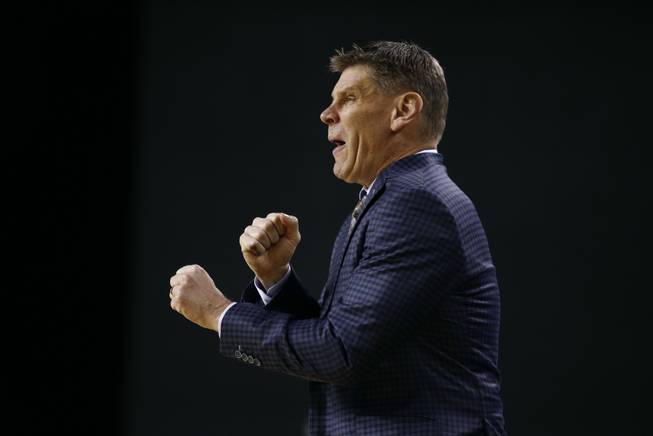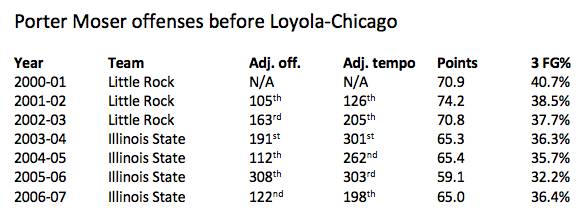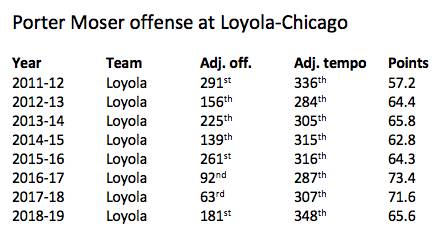
Assocaited Press
Loyola-Chicago head coach Porter Moser directs his players in the second half of an NCAA college basketball game against Maryland, Saturday, Dec. 8, 2018, in Baltimore.
Thursday, March 21, 2019 | 2 a.m.
Related content
We know that UNLV is open to hiring an established coach with a Final Four resumé, as athletic director Desiree Reed-Francois said she wants a face of the program who can stand next to Jon Gruden and Gerard Gallant in terms of star power. And we also know Reed-Francois is open to grabbing a smaller-school coach who could be on the way up in his career. With those parameters, there are a lot of coaches who match one of those descriptions.
But how many coaches actually satisfy both criteria?
Porter Moser is one of the rare potential candidates who could be described as a Final Four veteran and a rising star in the coaching ranks. Moser guided Loyola-Chicago to the Final Four last year, and at 50 years old this could be the perfect time to snatch him out of the Missouri Valley Conference and hand him the reins for UNLV’s next rebuilding job.
Could Moser be the guy to lead UNLV deep into March again?
The record
Moser has been a head coach at three schools, and each presented a different situation. His first job came at Little Rock, where he took over a team that went 4-24 the previous year (1-15 in the Sun Belt). It was statistically one of the worst teams in the country, but Moser had them playing better just one year later.
The biggest jump was in 3-point shooting. Little Rock made 36.0 percent of its long-range attempts the previous year, but Moser added a pair of freshmen who both shot above 45 percent, and the team’s overall accuracy improved to 40.7 percent, good for eighth in the country.
With the bump in offense, Little Rock improved to 18-11 overall and 9-7 in league play. The next season, the Trojans shot 38.5 percent from 3-point range (31st in the nation) and posted an 18-11 record (8-6 Sun Belt). They continued their impressive shooting in Moser’s third season, making 37.7 from 3-point range (44th in the nation) and recording a near-identical 18-12 record (8-6 Sun Belt).
At that point, posting three consecutive winning seasons at Little Rock were enough to make Moser a hot name for mid-major coaching openings. He made the jump to Illinois State, but things did not go as smoothly there.
Unlike the disaster at Little Rock, Moser took over a middling Illinois State team that went 56-64 the previous four years (34-38 in the Missouri Valley Conference) and did little to move the needle. He spent four seasons on the job and never posted a winning record in conference play. His best campaign came in Year 2, when the Redbirds went 17-14 overall and 8-10 in the MVC.
After struggling to a 51-67 mark through four years, Illinois State fired Moser. His final season saw the Redbirds slump to 15-16 overall and 6-12 in the conference. His cumulative MVC record was a dismal 22-50. Even worse, Tim Jankovich replaced him and immediately ripped off three consecutive 20-win seasons.
The issue was offense — Moser simply couldn’t find a way to sustain a good scoring attack at Illinois State. In his third year, the Redbirds actually finished outside the top 300 in KenPom.com’s adjusted offense rankings:
With that failure on his resumé, there was no head coaching job for Moser the following season. He instead joined Rick Majerus’s staff and spent the next four years as an assistant coach at St. Louis.
Once his image was sufficiently rehabilitated, Moser was named the head coach at Loyola Chicago in 2011.
Building Loyola
Moser took over a Loyola-Chicago program that had one winning conference season in the eight years prior to his arrival, so he wasn’t walking into a turn-key scenario. But still, the Ramblers really bottomed out in Moser’s first three years on the job. They went 7-23 in Year 1, including a 1-17 mark in the Horizon League, and his cumulative record after three seasons was just 32-61, with a 10-42 mark in conference play. It’s kind of amazing Moser was able to survive that stretch, but he kept his job and Loyola finally surged in Year 4, improving to 24-13 and 8-10 in the Horizon in 2014-15.
It took two more years of backsliding (combined record of 33-31, 15-21 MVC in 2015-16 and 2016-17) before the Ramblers broke out again, this time with a March run for the ages. Loyola racked up a 32-6 record and advanced to the Final Four in the 2018 tournament, putting Moser back on the map as a name to watch.
Those Ramblers played the same style as Moser’s previous teams — they just did it better. It was one of the 50 slowest-tempo teams in the country (No. 307 according to KenPom), but Moser’s spacious system allowed his four-guard lineups to pick opponents apart with motion, ball movement and shooting. For the season they scored 1.00 points per possession, which ranked 24th in the nation.
It was just the second time in Moser’s 14-year career (to that point) that one of his offenses finished in the top 100 in efficiency (63rd):
It was a brilliant run through the NCAA tournament, but Moser was not able to sustain the momentum this season. The Ramblers regressed to 20-14 on the year and 12-6 in the MVC, and their quest for another NCAA berth came up short when they were knocked out in the semifinals of the conference tournament.
The run
So what do we make of the run to the Final Four? Was it a masterwork by a coach just coming into his own? Is it something Moser can possibly replicate given the proper resources? Or was it the outlier of all outliers on an otherwise unimpressive resumé?
As noted above, Moser didn’t do anything different in order to prime his team for that run. The Ramblers’ offensive system was pretty much the same as it was two years earlier, when they went 15-17. The core of the team was special, however. Five players averaged double figures in scoring, and Moser gets credit for recruiting all of them.
And Moser utilized several avenues for recruiting that nucleus. Of the top six players on that team, two were four-year seniors that Moser landed out of high school (Ben Richardson, Donte Ingram), two were college transfers (Marques Townes, Clayton Custer), one was a sophomore who was recruited out of high school (Aundre Jackson) and one — star center Cameron Krutwig — was a freshman recruit.
Two were 3-star prospects (Custer and Krutwig), and the rest of the roster was made up of 2-stars and lower.
It’s worth noting that Loyola didn’t play above its head in the NCAA tournament. In their four tourney wins, they shot 52.5 percent from the field and 41.7 percent from 3-point range; in the rest of their games, they shot 50.4 percent and 39.3 percent, respectively. Defensively, the Ramblers held opponents to 42.5-percent shooting in their four postseason wins; in all other games, opponents actually shot worse (41.3 percent).
If Loyola didn’t “get hot,” then how did that Final Four run happen? Well, a lot of good fortune was involved. Their first three wins came by four combined points, including a nail-biter over Mountain West darling UNR in the Sweet 16. The Ramblers’ Elite Eight victory over Kansas State was a legit beatdown — the final was 78-62 — but the other three contests could have gone either way in the final minute.
Given the rest of Moser’s coaching history (which includes no other NCAA appearances in 15 years), it’s looking more and more like Loyola’s miraculous run actually was a miracle.
Bottom line
Moser’s record at the lower levels of college basketball has not been good. Aside from the 2017-18 season, his career mark is 214-220. His record in-conference, without that one superlative season, is 45-76. And while those levels of Division I come with their own challenges, winning in the Sun Belt Conference, the Horizon League and the Missouri Valley Conference is not exactly climbing Mount Everest.
And yet… you can’t just take away that season. For one thing, it wasn’t just an NCAA tournament Cinderella story — Loyola was dominant during the regular season, too, fielding the nation’s No. 17 defense and No. 63 offense (according to KenPom). If Moser’s system is capable of producing that level of performance, what would he be capable of doing with better recruits?
Loyola is obviously happy with Moser now, as they extended his contract through the 2025-26 season. The school is also building an $18-million practice facility in an effort to keep him around, so it’s not a forgone conclusion that UNLV would be able to pry him away from his hometown.
There’s some stuff to like about Moser’s profile. His teams defend hard and gang rebound, and he puts an emphasis on getting as many shooters on the floor as possible. If you want a coach to grind out wins, Moser can do that.
But he has been a head coach for 15 seasons now, and he has one (albeit glorious) NCAA tournament appearance to show for it. And if Loyola hadn’t been patient enough to sit through six losing seasons at the start of his tenure, the run never would have happened.
Would Moser’s leash be that long at UNLV? Obviously not. The next coach probably has to make the big dance in Year 2 in order to feel safe about his job security, and aside from his modest success at Little Rock, quick turnarounds have not exactly been one of Moser’s strengths.
Moser plays a slow, deliberate style that would be hard for UNLV fans to support if it didn’t produce wins right away. And given his track record, it doesn’t seem like Moser would be able to get UNLV to the top of the Mountain West quickly enough.
As much as the Rebels’ fan base longs for a Final Four run, Moser does not seem like a good bet to be able to do it again. And with Reed-Francois’s own job security potentially hinging on this hire, it’s probably not a bet she can afford to make.
Mike Grimala can be reached at 702-948-7844 or [email protected]. Follow Mike on Twitter at twitter.com/mikegrimala.



Join the Discussion:
Check this out for a full explanation of our conversion to the LiveFyre commenting system and instructions on how to sign up for an account.
Full comments policy